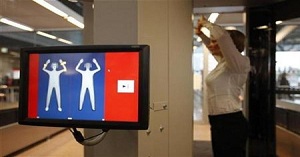The Indira Gandhi International airport has done away with the body scanner machine installed at Terminal 3 due to its poor performance. But with no replacement at hand, security officials are back to manual scanning of passengers through metal detectors, which is not foolproof.
“We had installed a body scanner machine (Pro Vision 2) to detect concealed objects made of metallic and non-metallic materials. During the trial period, the machine did not give the desired result,’ said an official of the Airports Authority of India. It has multiple technical loopholes and hence, we decided to remove it following recommendations from CISF,” the official added.
Multiple security agencies deployed at IGI observed that smuggling of gold, silver and contraband have been on the rise since last year with passengers concealing them inside their bodies. On November 15, 2016, two drug traffickers from Afghanistan were arrested from T3 after the health of one of them named Gulam Rabani deteriorated. He was offloaded and admitted in AIIMS where doctors found 57 capsules of heroin concealed in his stomach. ‘Rabani had managed to dodge security agencies at T3 and boarded the flight. If his health would not have deteriorated, he could have managed to smuggle top quality heroine worth Rs 2 crore out of the country. The incident was an eye opener for us,’ an official said. Airport authorities had also imported a German-made body scanner machine but that too failed on technical parameters and was therefore rejected by security officials.
“We need a scanning machine emitting safe radio waves and capable of detecting a broad range of targets including weapons, explosives, banned liquids, gel, powder, plastic, metals, ceramic, etc. Many passengers conceal these banned items and manage to pass through manual scanning,” a CISF officer said. CISF had cracked five cases at T3 last year where drug traffickers had tried to smuggle in heroin, ketamine and marijuana.








